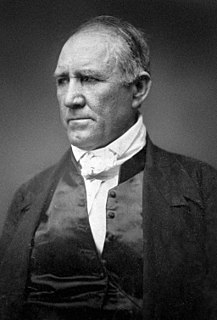A Quote by Tony Benn
I opposed the Suez war, I opposed the Falklands war. I opposed the Libyan bombing and I opposed the Gulf war and I never believed that any of those principled arguments lost a single vote - indeed, I think they gained support though that was not why you did it. What has been lacking in Labour politics over a long period is a principled stand
Related Quotes
I have ever been opposed to banks, - opposed to internal improvements by the general government, - opposed to distribution of public lands among the states, - opposed to taking the power from the hands of the people, - opposed to special monopolies, - opposed to a protective tariff, - opposed to a latitudinal construction of the constitution, - opposed to slavery agitation and disunion. This is my democracy. Point to a single act of my public career not in keeping with these principles.
When I was arrested opposing the war in Vietnam in 1965, as I said about 20 or 30% of people were opposed to the war. By 1968, more than half of Americans were opposed to the war. If you pull in Europeans, Canadians, people from around the Third World, the war was vastly unpopular. But even half of Americans by 1968 opposed the war.
There's no doubt in my mind, though, that the Iraqi people would be better off with a different leader who did not waste their oil on weapons, as opposed to education, as opposed to healthcare, as opposed to food, as opposed to roads, as opposed to clean water. It is really sinful, a crime, what Saddam Hussein has done with the wealth of the Iraqi people over the last 30 years.
Most of us who were opposed to the war, especially in the early '60's - the war we were opposed to was the war on South Vietnam which destroyed South Vietnam's rural society. The South was devastated. But now anyone who opposed this atrocity is regarded as having defended North Vietnam. And that's part of the effort to present the war as if it were a war between South Vietnam and North Vietnam with the United States helping the South. Of course it's fabrication. But it's "official truth" now.
Judging by their positions at the time, rather than their post hoc allegations, Democrats adored the Soviet Union. Congressional Democrats repeatedly opposed funding anti-Communist rebels, they opposed Reagan's military build-up, they opposed building a shield to protect America from incoming missiles, they opposed putting missiles in Europe. As a rule, Democrats opposed anything opposed by their cherished Soviet Union.
If you look back to the anti-intervention movements, what were they? Let's take the Vietnam War - the biggest crime since the Second World War. You couldn't be opposed to the war for years. The mainstream liberal intellectuals were enthusiastically in support of the war. In Boston, a liberal city where I was, we literally couldn't have a public demonstration without it being violently broken up, with the liberal press applauding, until late 1966.
The benefit of writing a collection - as opposed to a novel - is that I'm able to have some version of the war in each story without having to comment on its all-encompassing nature. Turn the page and here are new characters and new situations, but the war remains... Isn't that how life has been for us for over a decade?
One very difficult decision was deciding to vote against the appropriations bill for the war. I had consistently said that I wanted to make sure our troops got the adequate and training in the war effort, despite the fact that I opposed the war at the point that the president decided to double down and send more troops. I had to vote against funding as a way of bringing it back to the table. That was a difficult decision for me.































